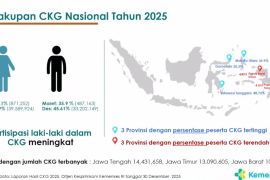Jakarta (ANTARA) - Indonesia's Health Ministry said that it has expedited the cervical cancer screening trial for women aged 30–69 in 26 districts/cities in 15 provinces this year in a bid to eliminate the disease by 2030.The ministry's acting director general for disease prevention and control, Yudhi Pramono, said here on Tuesday that in 2023, the ministry held the HPV DNA cervical cancer screening trial in five areas of Jakarta.
"God willing, in the future, we will expedite it to national scale, as per program by the new government," Pramono said.
According to the official, screening is one of the three efforts being made by the ministry to prevent and control cervical cancer. He noted that the ministry is aiming for 75 percent coverage in terms of screening in the target group.
The other efforts include pushing for 90 percent HPV vaccination coverage among boys and girls aged 15, and ensuring that 90 percent of women who suffer from pre-cervical cancer lesions and cancer receive treatment that meets the standard.
The ministry, he said, has formulated the 2023–2030 National Action Plan for Cervical Cancer Elimination as a comprehensive effort to eradicate the disease, and as a means to empower women and build health resilience.
According to him, cervical cancer has the second-highest incidence among cancers affecting Indonesian women, with 36 thousand cases and 20 thousand deaths reported in 2022. At least 70 percent of patients came in when the cancer had progressed to an advanced stage.
He referred to 2023 data from Social Health Insurance (BPJS Kesehatan), which showed that cancer treatment in total cost Rp5.9 trillion ( USD1 = Rp15,850.80). This shows that there is a need for better efforts to prevent and control catastrophic diseases such as cancer, he added.
Baca juga: Public education needed for early detection of cancer: Health Minister
Baca juga: Bio Farma's NusaGard vaccine to be used for cervical cancer prevention
The director general stressed that his administration has consistently promoted preventive and control measures against cervical cancer at the World Health Assembly, such as immunization program integration, reproductive system health, and inclusive partnerships with the non-health sector.
He highlighted the importance of support and partnership from ministries, institutions, and stakeholders in promoting the three initiatives to achieve complete cervical cancer elimination.
Pewarta : Mecca Yumna Ning Prisie
Editor:
I Komang Suparta
COPYRIGHT © ANTARA 2026









